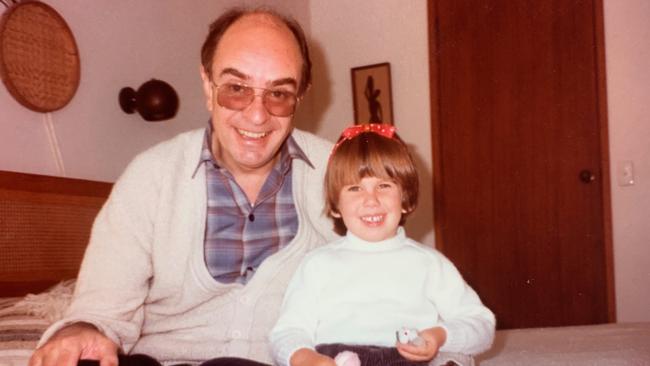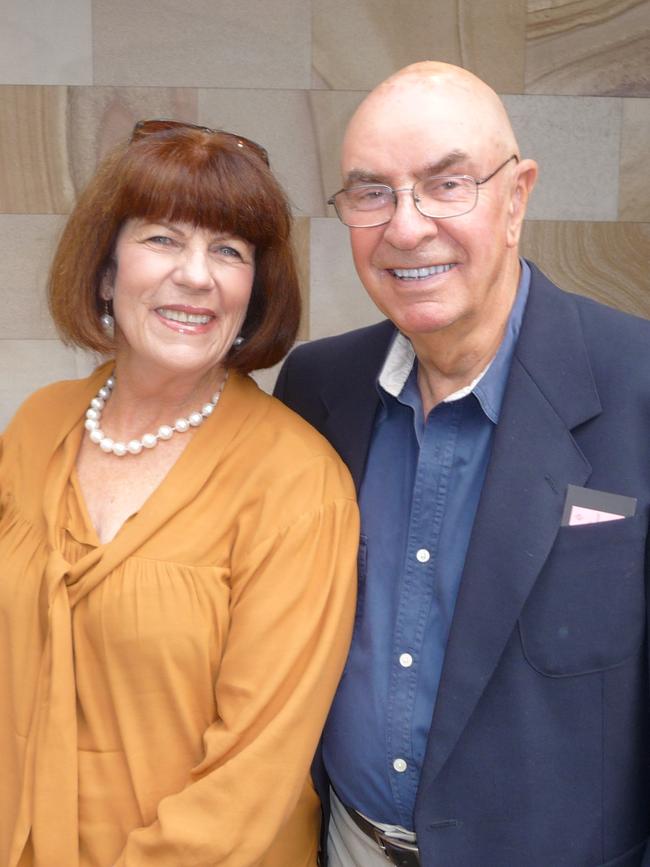A Gold Coast man, much loved by his family, was sent to one of the city’s best aged care homes after developing Parkinson’s. But before long trouble started, and his daughter discovered a horrifying secret.
Set among lush tropical gardens in the heart of the Gold Coast, the aged care home seemed an oasis of peace in a desert of decline.
But appearances can be deceiving.
While the facility’s fountain splashed prettily in the courtyard – just like in the brochure, there was abuse occurring behind its closed doors.
The horrible secret was uncovered by award-winning poet and academic Sarah Holland-Batt, who discovered that her father, retired mining engineer Tony, was not only being deliberately targeted by a carer, but was also the subject of catastrophic failures of our aged care system.
In August last year, Sarah was called to testify at the Royal Commission into Aged Care, to detail the five years of maltreatment her father suffered after leaving the family’s Sorrento home due to the progression of his Parkinson’s Disease.
Despite searching for the best aged care address on the Coast, Sarah describes her father’s experience as a “drumbeat of failure” – from being left in soiled clothes, to being given the wrong drugs, to suffering repeated injury and not being treated for serious infections and even broken bones.
In March this year, just one week before Australia’s aged care accommodations were forced into lockdown, Tony died after contracting pneumonia. Surrounded by his family, and at last away from his nursing home nightmare, he passed away peacefully in hospital.
A FRIGHTENINGLY COMMON PROBLEM
While she misses her father every day, Sarah says she is so grateful his battle is over – that he never again need fight against Parkinson’s, the pandemic, or his aged care provider.
And even though his funeral was held virtually, thanks to Covid restrictions, Tony’s legacy may be greater than he ever imagined, with his daughter being hailed a crusader who is both hoping and helping to overhaul the ailing aged care industry.
With a glittering literary career behind her at the age of just 37 – including winning the 2016 Prime Minister’s Literary Award for Poetry, as well as being a critic, editor, poetry columnist for The Australian and an Associate Professor at QUT (and holding a few Masters degrees and a PhD), Sarah is now finding herself increasingly absorbed in her voluntary work to reform aged care.
“When all of this happened to my dad, I thought surely his case had to be an anomaly. Then I started reading and researching and really following the Royal Commission – as well as giving evidence to it – and I’ve ended up with a very good sense of just how badly the system works,” says Sarah, who was born and raised on the Gold Coast but now lives in Brisbane.
“What happened to my dad is actually frighteningly common. The failures that he experienced are emblematic of the industry, not an anomaly at all.
“What is really terrifying is knowing how extremely hard it was to fight against that system for any sort of care, let alone justice, for my dad. And I’m well-educated and relatively young. I have the time and resources to do it, but I barely could. How does anyone stand a chance?”
A TERRIBLE TRUTH IS REVEALED

Sarah says she and her mother noticed the first signs of neglect within weeks of her father moving into the aged care home in 2015.
She said despite fighting for better care, and even after referring issues to police, they continued to battle for his safety and wellbeing throughout those last years of his life.
“Even after being diagnosed with Parkinson’s, Dad was able to stay at home for the next 15 years, but ultimately he had to move for safety’s sake,” she says.
“So Mum and I did all the inspections, we were extremely diligent and we chose the aged care provider that appeared to have the nicest environment … we didn’t just pick any old one, and it was not cheap.
“But almost immediately we noticed these small things started happening, little things were not being tended to. He had a cold sore that no one had noticed – but how could you not notice when you’re brushing his teeth?
“These small things were really bothering me. I’d come in and he’d be wearing clothes with dried food on them, but they weren’t breakfast foods. Did they dress him in dirty clothes?
“The first big thing we realised was that he wasn’t getting his medication on time. Madopar is extremely important for Parkinson’s patients as it stops the tremors, which then prevents falls, but it must be delivered at an exact time so that it’s an uninterrupted coverage.
“They were missing the window by hours and hours, so he was experiencing huge troughs of no medication and he was repeatedly falling.
“Then he was prescribed medication which actually cancelled out the Madopar altogether, and as a result he fell and broke his hip. That is a catastrophic injury for someone of his age, let alone with Parkinson’s. He never walked again.
“Then no one would come when he called to go to the toilet so he’d try to get there without his wheelchair and fall again … it was a constant drumbeat of failure.”
While these systematic failures were shocking in both their regularity and damage, it was the next injury which up-ended the lives of the Holland-Batts.
After questioning an enormous swelling the size of a tennis ball on Tony’s elbow, Sarah and her mother were pulled aside by another carer and told a horrible secret.
“We were trying to figure out how this infection had occurred, it had obviously been swelling for days, but no one had any answer,” she says.
“But then one carer pulled us aside and said the woman who had been showering Dad had been victimising him. That this woman had let this infection fester and didn’t report it because she didn’t like him.
“She was the night shift carer, she worked alone and she was in charge of showering, she just watched him suffer.
“The whistleblower told us she had seen the woman close the door on Dad, telling the other carers that he was sleeping when he was actually awake and sitting in a dirty incontinence pad, she’d heard this woman yell at him to get his ‘nappies’ in the hall – knowing he can’t walk.
“She’d seen her push his wheelchair away from the bed so that it was out of reach, and tell him that she was ‘sick of your sh**.
“My father was the epitome of a gentle man. But even if he was horrible, that is no excuse to abuse someone in your care. It’s criminal.
“Well, after we heard this, I hit the roof.
“Mum and I wrote to the facility manager demanding answers and insisting this woman be dismissed and asking for assurances that this would never happen again.
“Instead, the manager rang us up to organise a mediation between the carer, my father and ourselves. It just … it was beyond belief. There was nothing to ‘mediate’, she hurt my father when he was at his most vulnerable.”
NO FACT-FINDING, NO INVESTIGATION, NO EVIDENCE SOUGHT
Sarah says their concerns were never met with appropriate regard and the carer was simply moved to a different ward.
She says she then turned to police and the aged care regulator, but still no action was taken.
“When we finally met with the manager, he showed up wearing a St Patrick’s Day T-shirt and mardi gras necklaces. Just no respect for the seriousness of the situation. It was just a small detail but so indicative of the whole situation. It was profoundly inappropriate.
“The manager was not shocked or surprised or even interested in what had happened to Dad, just upset that we’d been told. He was only worried that the whistleblower hadn’t followed ‘protocol’.

“But as she said to us, she told us because she knew he’d sweep it under the rug.
“He said he couldn’t do anything unless the whisteblower came forward, which was frightening for her, and so I went to the police instead.
“They said it was a civil, not a criminal, matter – which is something that needs to be changed, elder abuse should be considered a criminal act – and so I contacted the aged care regulator.
“That was beyond a farce. There was no fact-finding, no investigation, no interviews, no evidence sought … just a flurry of letters, false statements and false promises – which were simply accepted at face value.”
Sarah says she felt physically ill during this time, worrying that the carer in question would abuse other residents or that she would sneak back to her father’s room.
Ultimately, she says all she could do was ask the whistleblower to come forward, which she eventually did.
“I was then called by the aged care manager who said the carer was no longer at the facility, effective immediately. But I later found out they just moved her to a different aged care home.
“I could not have done any more than I did, but I was never even able to affect any action. What hope do we have to protect our loved ones when the system prefers to protect its failures?”
ANOTHER DARK SECRET
Sarah says even after the carer left the facility, her father’s care was still sub-par.
She says he suffered another fall where he broke four ribs, but at the hospital they discovered another dark secret.
“They found two other broken ribs that were partially healed. So he’d broken bones and no one had noticed it, or reported it. He was given no pain relief, no treatment, not even any supervision.
“This was a man who was fiercely loved and cared for by his family, but he had years of neglect that we actually paid for. How is this happening? How are we not marching in the streets to change it?
“We should all be terrified of the future if we don’t change the present situation.”
Sarah says while her father’s battle is over, she will never stop fighting for change within the industry until it’s a place where not just basic care is guaranteed, but the best care is delivered.
She says she is eagerly awaiting the final recommendations of the Royal Commission, due to be delivered in February, but says she is concerned that the Federal Government will not commit to all of the changes.
“I initially wrote a submission to the Royal Commission and they called me up to testify, ever since then I’ve continued to write about it and speak about it.
“The commission’s final report will be handed down in February 2021, but the Government will no doubt just cherry pick what it wants to action. It has no appetite for the overhaul we need.
“Why even have the commission if we’re not going to commit to change?
“We need to see a change in staff-to-resident ratios and more stringent training and skill requirements for staff. Right now, you can work as a carer with absolutely no qualifications. None. This is hard physical, mental and emotional work for which you receive little pay and little support … add to it that anyone can do it, and it’s little wonder we’re not getting the best staff.
“Having said that, so many of the staff are wonderful people but they have way too much work and no support. They are breaking under the strain and when they do, it’s the residents who suffer.
“We also need to see financial accountability from aged care providers. They’re given enormous federal funding - resident fees make up only 20 per cent of the funding, and 80 per cent is contributed by the taxpayer - but there are no regulations on how they spend it. All they have to do is meet accreditation standards, which are ridiculously low, and then they get a pile of cash which they don’t have to account for.
“The provider can choose to spend that money on care, on their grounds, on staff or just keep it for profit.
“We need a national register of aged care workers so that if there is abuse, as with my father, that worker is not just quietly moved around like a Catholic priest. We need absolute transparency.
“And we absolutely need to overhaul the regulator so that it has teeth. We need someone to complain to and who will take action when we do. That was the most outrageous thing of my family’s journey.
“It felt like I was screaming into the abyss while my father was being ground down.”
Sarah says while the outcome of her fight to change aged care is yet to be determined, she’s confident that her father would be proud.
“Dad was a very private person and so I worry sometimes about sharing so much about his life,” she says.
“But above that, he was a very ethical person with a strong sense of justice. I believe that, on balance, he would want me to tell his story. He would want to serve the greater good.
“I just want to see some action come from this. I’m tired of hearing the government say they will ‘consider recommendations’ and yet do nothing. It’s about creating meaningful change, it’s not about paying lip service or keeping up appearances.”
Because as Sarah knows far too well, appearances can be deceiving.


Ghost town: Once-exclusive shopping centre retailer’s plea
One of the Gold Coast’s best-known shopping centres is a ghost town with many key retailers having exited ahead of its $500m redevelopment – but those remaining pleading not to be forgotten.
‘Good luck with that’: Legendary developer’s stark warning
More than $5bn worth of developments are coming for the Gold Coast – but experts say it’s just a drop in the ocean of what’s needed. Read our special report on the city’s deepening housing crisis.